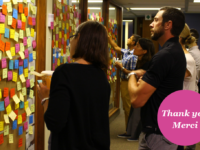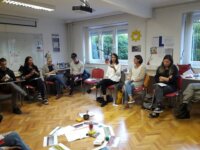Le LabZéro est un laboratoire d’innovation publique qui poursuit des objectifs “zéro”, comme “zéro personne à la rue”. Afficher une forte ambition permet de mobiliser les énergies et d’encourager la créativité. C’est un lieu tiers, piloté par l’État régional et animé par une équipe d’horizons différents, qui rassemble tous les acteurs concernés et volontaires pour trouver de nouvelles réponses aux questions de politiques publiques.
Innovation Tag: Social Innovation
Comoodle was developed to create a genuine sharing economy in Kirklees, fundamentally shifting the relationship between the Council and the community in the process.
Comoodle is a web based platform, an elegant solution to enable collaboration, that is now helping local communities to access and share under-used resources.
There is no other platform that exists across in the world that has public sector bodies actively sharing “stuff skill and spaces” in such a proactive and accessible way
Carrot Rewards is a platform promoting healthy living and public engagement that leverages behavioural economics, mobile tech and the power of loyalty programs to motivate and educate users to make better everyday lifestyle choices for themselves, their families and the planet. Created in collaboration with public sector agencies, leading Canadian health NGOs and the private sector. With over a million downloads, Carrot is driving sustainable positive behaviour change on a population scale.
The OEE established a Social Innovation "UnLab" (SIU) to test an embedded innovation model and amplify energy efficiency policy and service impacts in Canada. The SIU creates value for energy efficiency stakeholders in three ways:
Building relationships and capacity for energy efficiency policy and service innovation;
Generating evidence and collective learning by co-creating and testing insights and interventions;
Amplifying impacts by scaling learning and implementing what works.
The challenge the city Ljubljana wanted to address was how to approach young people who have ideas. What works well, and what could be even better? City Incubator is a programme for the implementation of the ideas of young people in Ljubljana. It is a sustainable tool for implementation and co-financing of local youth initiatives. Individuals or groups may put ideas forward and in the frame of the programme, they receive professional support for the fine-tuning, and financial support for the…
Case Study
Vitamin Lab: How to Take Citizen Responsiveness and Integrity in Health Services to the Next Level

The innovation was developed to tackle the problem of corruption in the Lithuanian healthcare sector. We conducted a Vitamin Lab experiment to find out if the change of the clinic’s environment indirectly affects the behaviour of patients, how it can influence their attitudes towards the clinic, increase transparency and reduce bribery. To our knowledge, it was one of the first initiatives to use this type of measured social design interventions in the context of healthcare sector corruption.
Decidim est une plateforme numérique imaginée par la mairie de Barcelone dès 2016 pour créer et coordonner des espaces et des processus participatifs, qui vise à étendre et faciliter l’accès à la participation citoyenne en vue de la co-construction et de la co-production des politiques publiques. Il s’agit d’un projet européen open source : son code est ouvert et libre ; en d’autres termes, tout le monde peut le voir, l’utiliser, le copier ou l’enrichir.
Malopolska Incubator for Social Innovation is a funding space for bottom-up, widely-consulted and fully-supported innovations in the field of care services for dependents: elderly and disabled. We use everyday non-standard ways and practices unprecedented in local government administration: Design Thinking, creating open-sourced products, bureaucracy reduce, financing 100% of costs. Incubator is implemented by Regional Center for Social Policy in Krakow.
CivTech is the Scottish Government’s challenge programme for innovation. The programme pioneers a smarter, faster approach to public procurement to harness entrepreneurial tech innovation and citizen engagement, improving public service delivery, creating economic development opportunities and fostering an entrepreneurial mindset within government.
UNDP - Live Lebanon in collaboration with the Ministry of Public Works and Transportation, the National Council for Road Safety and MTV (media partner), introduced a new pothole patching technology called "Velocity" and launched a campaign called "Ensa Joura". whereby citizens can pinpoint potholes using a mobile application. The state of the art truck will go to the reported locations and instantly fix the potholes.




